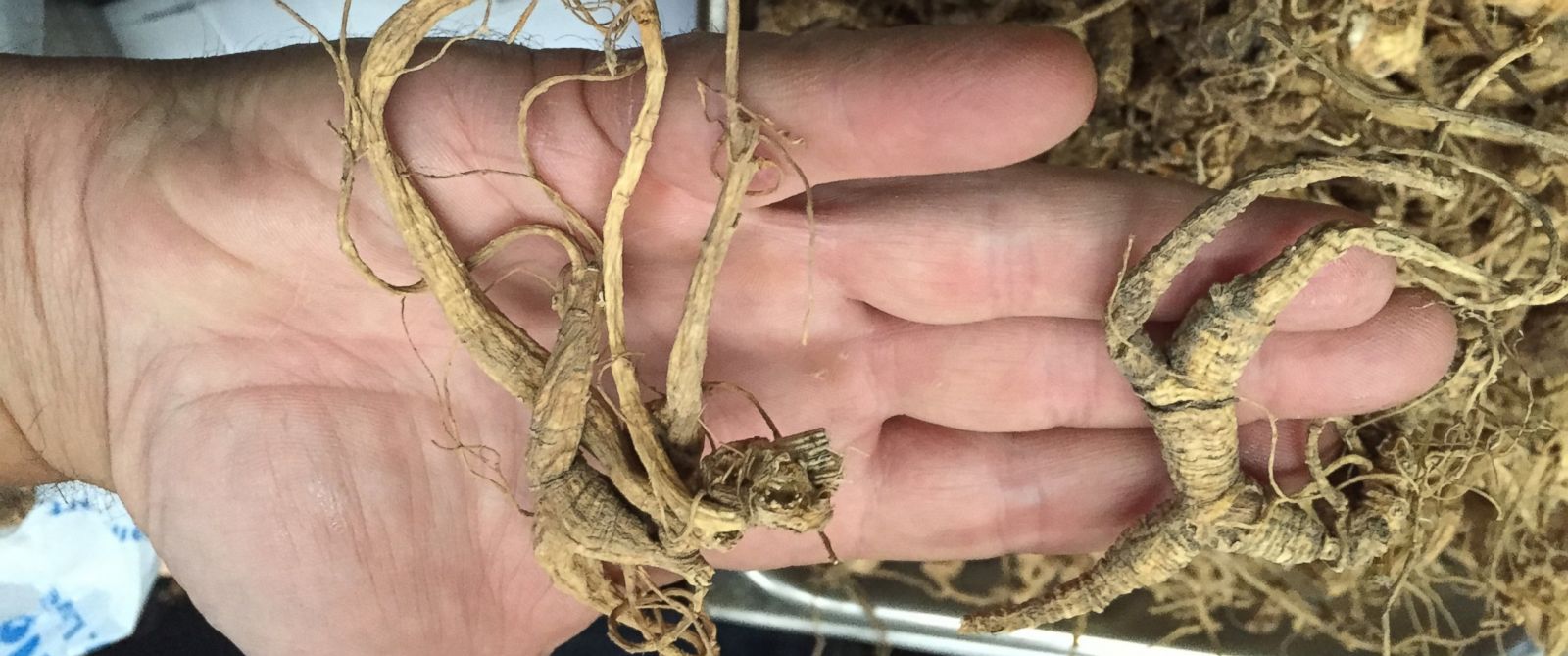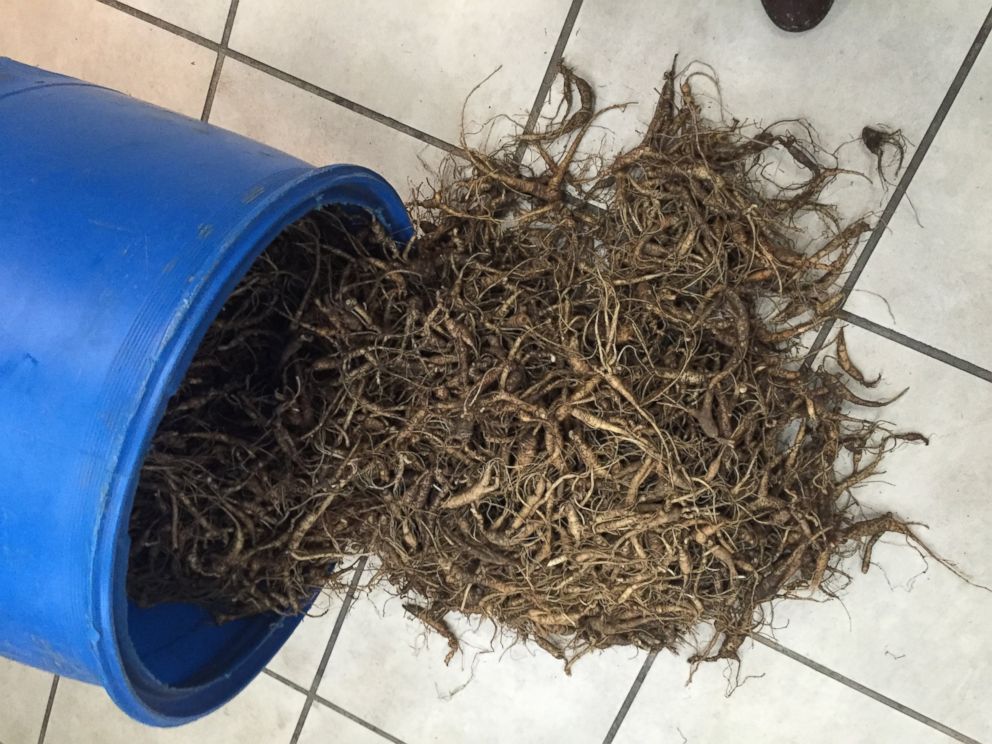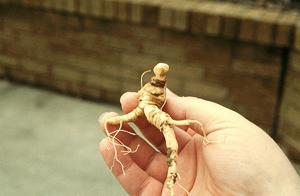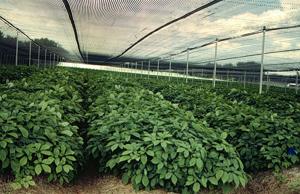Demand for Ginseng Boosts Prices, Tempts Poachers
Medicinal Herb Grows Wildly in Appalachia and the Midwest
By Kris Maher
Sept. 17, 2014 12:34 p.m. ET

A wild ginseng plant near Bryson City, N.C. Supplies have dwindled partly from the destruction of the forest habitats the plant needs to grow in. Associated Press
Strong demand from China for wild ginseng growing on shady hillsides throughout Appalachia and the Midwest has boosted prices for the medicinal herb as well as the number of people willing to break the law to dig it up and sell it.
Ginseng that grows in forests can fetch as much as $1,000 a pound, several hundred dollars more than five years ago, experts said. Prices have shot up amid increased demand from China's swelling middle class and a decline in U.S. exports due to several factors that include stepped-up harvesting regulations and less plentiful supplies.
Cultivated ginseng, grown under shade cloths in fields, sells for a fraction of the price because wild ginseng more closely resembles the plant indigenous to China.
The steep prices are tempting many to take to the woods with screwdrivers and homemade digging tools, state officials said.

In some cases, officials link the drug epidemic in Appalachian communities to increased poaching ahead of the harvest season, when seeds aren't ready to be replanted. Some poachers trade the plant for drugs or cash to buy illegal substances, officials said.
Officials with the West Virginia Division of Natural Resources said Wednesday they had seized 190 pounds of illegal ginseng with a projected market value of $180,000 in the weeks leading up to the season that began Sept. 1. That is up from 30 pounds in a typical year.
Officials arrested 11 people and seized two stolen handguns, cash and pain pills.
"It's the most we've ever seen," said Capt. Larry Case, the division's head of law enforcement for eight counties in southern West Virginia.

A crackdown on illegally harvested ginseng in West Virginia this August netted roughly 200 pounds of ginseng, illegal drugs, weapons and $30,000 in cash. Larry Case
Other states also are reporting more ginseng busts. Earlier this month, officials in southern Indiana cited or arrested 25 people for possessing ginseng before the legal season or stealing it from private property.
Overall, the state already is close to topping the total number of ginseng-related arrests last year.
In August, a repeat poacher in North Carolina was sentenced to 5½ months in prison. In the past year, Wisconsin officials launched Project Red Berry to crack down on ginseng poachers. They issued 175 citations, up from 30 in a typical year.
Some poachers draped camouflage over their cars to try to avoid being discovered.
Poaching ginseng and trespassing typically are misdemeanors and require diggers, also known as "sangers," to pay a fine of several hundred dollars and turn over illegally obtained ginseng.
Dealers can face federal felony charges if they transport illegally obtained ginseng across state lines.
Law-enforcement officials admit that fines aren't enough to deter many poachers who can just dig up more ginseng. They also say it is impossible to adequately police the millions of acres that ginseng can grow on.
Ginseng was discovered in North America in 1715 and has long been exported to China, where it is used as a health tonic or traditional treatment for male sexual dysfunction.
Some experts say there is evidence the American Revolution was partly financed by the ginseng trade because George Washington borrowed money from early trappers who dealt in furs and ginseng. Others note that John Jacob Astor commissioned a ship and sold thousands of pounds of ginseng, along with furs, to China.In 1804, Joseph Smith Sr., the father of the founder of the Mormon Church, sold ginseng for more than $4 a pound. By 1956, the wholesale price was about $20 a pound.These days, the plant is exported from the U.S. in larger volumes than any other native species covered by a treaty between the U.S. and 180 countries that regulates the trade of endangered wildlife.
The annual wholesale value of the American ginseng trade is $26.9 million, according to the U.S. Fish and Wildlife Service. About 90% of wild ginseng from the U.S. is exported to Hong Kong before it makes its way to other Asian destinations.
In 2012, the U.S. exported 45,000 pounds of wild ginseng, compared with 342,000 pounds of cultivated ginseng.
Wild ginseng supplies have dwindled around the world, partly from the destruction of the forest habitats it requires to grow. In recent years, U.S. regulators have banned or restricted the harvest of ginseng on federal lands and in many state forests.
Some state officials and ginseng dealers are concerned that increased poaching could endanger ginseng supplies. The 19 states that permit ginseng harvesting enforce strict rules. Diggers are supposed to remove only mature plants and replant the seeds of ripened red berries at the same location.
Robert L. Beyfuss, a widely recognized ginseng expert and former official at a Cornell University natural-resource program in upstate New York, said a significant amount of ginseng is harvested and sold each year without being reported.
"It's so easy to sell ginseng illegally," he said.
Mr. Beyfuss echoed a belief among some experts that the regulations work against the preservation of wild ginseng, and have limited harvesting by those who follow the rules, while not discouraging poachers.
For example, the rules require diggers to take the entire root to show that the plant is mature.
In the past, however, diggers would leave behind part of the root, which would allow the plant to grow back more quickly.
Write to Kris Maher at
kris.maher@wsj.com



 Reply With Quote
Reply With Quote














:max_bytes(150000):strip_icc()/112222-Clean-slate-lead-323c311208974e0c9d2ca52fea828499.jpg)
